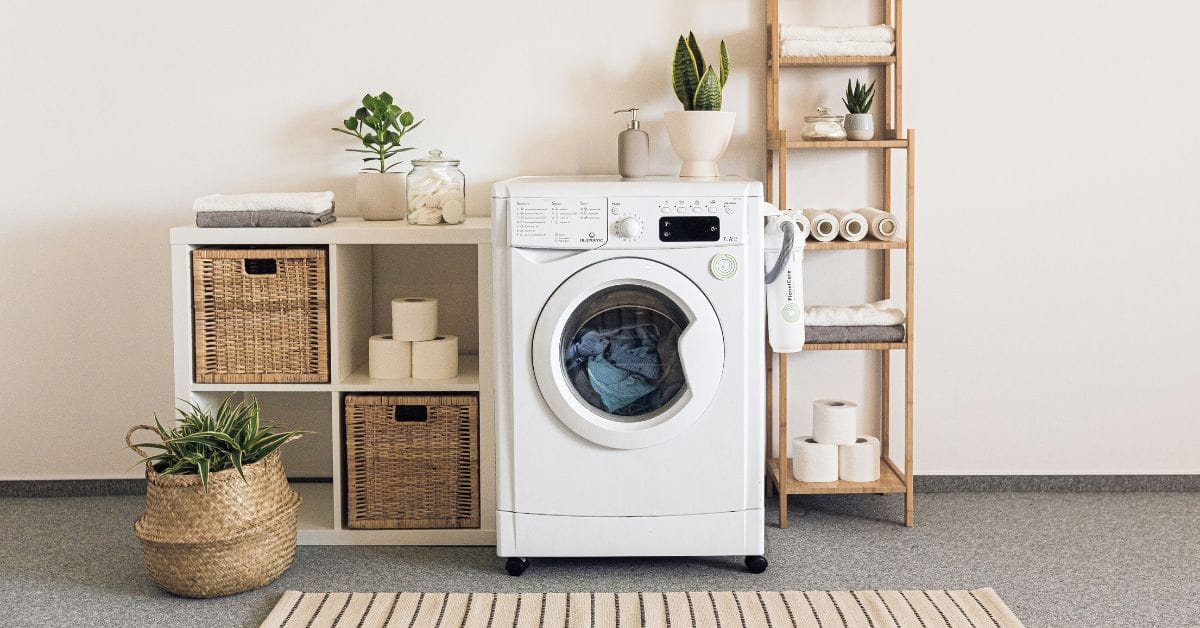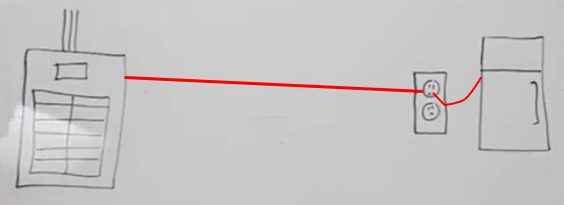Does a Washing Machine Need a Dedicated Circuit? (Guide)

Hey there, I’m here to illuminate a question that might be spinning in your head: Does your washing machine need a dedicated circuit?
A washing machine needs a dedicated circuit due to its high electricity load. The electrical system can be overheated if a washing machine is not connected to a dedicated circuit. Thus, the circuit breaker will trip, and the circuit might deteriorate.
So, let’s dive into the world of washing machines and circuits. We’ll explore why dedicating a circuit to your washer isn’t just a good idea – it’s often necessary. I’ll walk you through everything you need to know. Buckle up; it’s going to be an enlightening ride!
Understanding the Need for a Dedicated Circuit for Your Washing Machine

In my time upgrading and fixing homes, I’ve seen a lot of laundry rooms and kitchens. The common thread?
Appliances like washing machines, dryers, and stoves often have their own dedicated circuits. Why? It’s all about handling power safely and efficiently.
Think about it this way: a typical washing machine can use up to 2200 watts. And let’s not forget about dryers – they can pull between 10 to 15 amps on a 15- or 20-amp circuit. So, if you’ve got a washing machine chugging along on the same circuit as other appliances, you’re asking for trouble.
Dedicated circuits are there to save the day. They’re like exclusive roads for each of your power-hungry appliances. By giving your washing machine its own circuit, you’re preventing the electrical system from getting overwhelmed. No one likes a tripped breaker in the middle of a laundry cycle.
And here’s some wisdom from my experience: appliances that draw 1000 watts or more generally need their own circuit. It’s not just about power; it’s about duration, too. The longer an appliance runs, like your washing machine, during a heavy load, the more important it is to have it on a dedicated circuit.
Remember that a dedicated circuit for your washing machine isn’t just a good idea – it’s necessary for a smooth-running home. Stay safe, and keep those appliances happy!
Choosing the Right Outlet for Your Washing Machine

From my days of revamping homes, I’ve learned that heavy-duty appliances, like washing machines, need the right outlet to function properly. We’re talking about machines that can pull up to 2200 watts on a 15- or 20-amp circuit. That’s some serious power!
Now, the go-to choice here is a 220-volt outlet. Why this specific type? Well, it’s designed to handle the high energy demand of your washer. And here’s the crucial part – this outlet should be part of a dedicated circuit.
The plug for this setup? It’s got three prongs. The first two are the workhorses, handling the incoming and outgoing electrical currents. But that third prong – usually the rounded one – that’s your safety buddy. It grounds the washing machine. Grounding is important because it prevents electrical mishaps, especially during a power surge. Believe me, you don’t want to skimp on safety.
Remember, the right outlet makes all the difference regarding appliances. Stay safe and power up correctly!
Comparative Analysis: Dedicated Circuits for Washing Machines
In my years of sprucing up homes, I’ve seen all sorts of electrical setups. Let me explain the difference between homes with dedicated circuits for their washing machines and those without. Trust me, it’s more exciting than it sounds!
| Aspect | With Dedicated Circuit | Without Dedicated Circuit |
|---|---|---|
| Safety | Pro: Far safer. I’ve been in homes where the dedicated circuit prevented electrical mishaps. You don’t want a laundry day to turn into a fire drill! | Con: Higher risk of electrical overloads and short circuits. I’ve seen a few scary situations where overloaded circuits caused major safety hazards. |
| Appliance Health | Pro: Washing machines last longer. Dedicated circuits mean a steady power supply and less wear and tear. | Con: More breakdowns and maintenance issues. Fluctuating power can mess with the machine’s internals. |
| Electrical Efficiency | Pro: It’s like giving your washing machine a VIP electrical lane. This efficient setup can handle high loads without a hiccup. | Con: Potential for power dips and surges affecting other appliances. Have you ever seen lights flicker when the washer’s on? Not ideal. |
| Installation Cost | Con: Upfront costs can be higher. Installing a dedicated circuit isn’t cheap, but consider it a long-term investment. | Pro: Cheaper initially since you’re using existing circuits. But remember, cheap now doesn’t always mean cheap later. |
| Convenience | Pro: Peace of mind is a big deal. Knowing your laundry setup is solid lets you sleep better at night. | Con: The inconvenience of tripped breakers or halted wash cycles can be a real pain. |
Remember, electrical work is not a DIY playground – always consult a professional. Stay safe and make smart choices for your home!
Navigating Local Code Requirements for Your Home’s Electrical System
In my years of hammering and drilling through various homes, I’ve learned one thing: compliance with local building and electrical codes isn’t just red tape; it’s about ensuring safety and avoiding costly mistakes.
Why Local Codes Matter?
Each area has its own set of codes, and they’re there for a reason. They ensure that electrical installations, like your washing machine’s circuit, meet safety standards. I’ve seen situations where ignoring these codes led to dangerous outcomes, not to mention voiding home insurance policies.
Common Code Considerations
- Dedicated Circuits Requirement: Many local codes now require dedicated circuits for certain appliances, especially heavy-duty ones like washing machines. This isn’t just a suggestion – it’s a must for safety and efficiency.
- Circuit Amperage and Capacity: Codes often specify the minimum amperage for circuits powering major appliances. I remember a project where we had to upgrade the entire circuitry to meet these standards – an extra step but a worthy one for safety.
- Outlet Specifications: Specifics about outlet types, like the need for GFCI (Ground Fault Circuit Interrupter) outlets in laundry rooms, are common in these codes. Trust me, you don’t want to mess this up.
- Proper Installation and Inspection: Most codes require professional installation and inspection of electrical work. DIY is great, but having a pro on board is often a legal necessity for wiring.
From my experience, always check with your local building authority before starting any major electrical work. The rules can vary widely. In one neighborhood, I could wire a laundry room one way, but just a few miles away, the requirements were different.
Remember, keeping up with code isn’t just ticking boxes; it’s about protecting your home and loved ones. Don’t take shortcuts on this one. Do your homework, consult with professionals, and make sure your home’s electrical system is up to code and up to speed.
Frequently Asked Questions
- Is It Expensive To Install A Dedicated Circuit?
- It can be a bit pricey upfront, but it’s a smart investment. Like buying quality tools, spending more now can save you heaps of trouble (and cash). Always get a quote from a licensed electrician.
- Can I Install A Dedicated Circuit Myself?
- Unless you’re a certified electrician, I’d say no. Electricity is not something to mess with. Hiring a professional ensures safety and compliance with local codes.
- What Is A Ground Fault Circuit Interrupter (GFCI) And Do I Need One?
- A GFCI is a fast-acting circuit breaker that cuts off power in the blink of an eye when a fault is detected. For laundry rooms, especially near water sources, it’s a smart safety move. It’s like having a quick-reflex safety net.
- Can Other Appliances Share The Washing Machine’s Circuit?
- I’d advise against it. Washing machines are like the hogs of the electrical world – they like their space. Sharing can lead to overloads and, frankly, a lot of headaches.
- How Do I Know If My Circuit Can Handle A Washing Machine?
- Check the washer’s wattage and compare it with your circuit’s capacity. It’s like ensuring your ladder is long enough before climbing.
- Should I Upgrade My Old Circuit For A New Washing Machine
- Absolutely. If you’re bringing in a new, high-efficiency washer, it’s wise to ensure your circuit can handle it. Older circuits might not be up to the task, and it’s like giving a new car old, worn-out tires.
References
Organizations:
- National Electrical Manufacturers Association (NEMA). https://www.nema.org/
- Underwriters Laboratories (UL). https://www.investopedia.com/terms/u/underwriters-laboratories-ul.asp
- International Electrotechnical Commission (IEC). https://www.iec.ch/homepage
- National Fire Protection Association (NFPA). https://www.nfpa.org/en
Books:
- “Wiring a House” by Rex Cauldwell. https://www.barnesandnoble.com/w/wiring-a-house-rex-cauldwell/1118175264
- “The Complete Guide to Home Wiring” (Black & Decker). https://www.bookrackjackson.com/product/219737/The-Complete-Guide-to-Home-Wiring-A-Comprehensive-Manual-from-Basic-Repairs-to-Advanced-Projects-Black-Decker-Home-Improvement-Library
- “Electrical Code Simplified – Residential” by P.S. Knight. https://books.google.com/books/about/Electrical_Code_Simplified_Residential.html?id=CoHcAAAACAAJ
Website Resources:
- Energy Star Website. https://www.energystar.gov/
- This Old House. https://www.thisoldhouse.com/
- Electrical Safety Foundation International (ESFI). https://www.esfi.org/
Video References:
Spotlight Energy Solutions
ike nui
